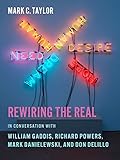Rewiring the Real : In Conversation with William Gaddis, Richard Powers, Mark Danielewski, and Don DeLillo / Mark C. Taylor.
Material type: TextSeries: Religion, Culture, and Public Life ; 12Publisher: New York, NY : Columbia University Press, [2013]Copyright date: ©2013Description: 1 online resource (344 p.) : ‹B›B&W Illus.: ‹/B›21Content type:
TextSeries: Religion, Culture, and Public Life ; 12Publisher: New York, NY : Columbia University Press, [2013]Copyright date: ©2013Description: 1 online resource (344 p.) : ‹B›B&W Illus.: ‹/B›21Content type: - 9780231160414
- 9780231531641
- American literature -- 20th century -- History and criticism
- American literature -- 21st century -- History and criticism
- Spirituality in literature
- Technological innovations -- Religious aspects
- Technology in literature
- Technology -- Religious aspects
- Theology in literature
- LITERARY CRITICISM / American / General
- 810.9356 23
- PS228.T42 T39 2013
- PS3557.A28 T39 2015
- online - DeGruyter
- Issued also in print.
| Item type | Current library | Call number | URL | Status | Notes | Barcode | |
|---|---|---|---|---|---|---|---|
 eBook
eBook
|
Biblioteca "Angelicum" Pont. Univ. S.Tommaso d'Aquino Nuvola online | online - DeGruyter (Browse shelf(Opens below)) | Online access | Not for loan (Accesso limitato) | Accesso per gli utenti autorizzati / Access for authorized users | (dgr)9780231531641 |
Frontmatter -- Contents -- List of Illustrations -- neχus -- 1. Counterfeiting Counterfeit Religion -- 2. Mosaics: Richard Powers, Plowing the Dark -- 3. Figuring Nothing: Mark Danielewski, House of Leaves -- 4. "Holy Shit!": Don DeLillo, Underworld -- 5. Concluding Unscientific Postscript: Two Styles of the Philosophy of Religion -- Acknowledgments -- Notes -- Index
restricted access online access with authorization star
http://purl.org/coar/access_right/c_16ec
Digital and electronic technologies that act as extensions of our bodies and minds are changing how we live, think, act, and write. Some welcome these developments as bringing humans closer to unified consciousness and eternal life. Others worry that invasive globalized technologies threaten to destroy the self and the world. Whether feared or desired, these innovations provoke emotions that have long fueled the religious imagination, suggesting the presence of a latent spirituality in an era mistakenly deemed secular and posthuman.William Gaddis, Richard Powers, Mark Danielewski, and Don DeLillo are American authors who explore this phenomenon thoroughly in their work. Engaging the works of each in conversation, Mark C. Taylor discusses their sophisticated representations of new media, communications, information, and virtual technologies and their transformative effects on the self and society. He focuses on Gaddis's The Recognitions, Powers's Plowing the Dark, Danielewski's House of Leaves, and DeLillo's Underworld, following the interplay of technology and religion in their narratives and their imagining of the transition from human to posthuman states. Their challenging ideas and inventive styles reveal the fascinating ways religious interests affect emerging technologies and how, in turn, these technologies guide spiritual aspirations. To read these novels from this perspective is to see them and the world anew.
Issued also in print.
Mode of access: Internet via World Wide Web.
In English.
Description based on online resource; title from PDF title page (publisher's Web site, viewed 02. Mrz 2022)


